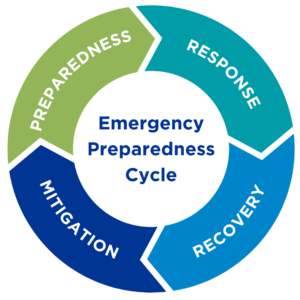Managing Crisis at All Levels: A Structured Approach
By Carlos D. Torres, Resilience Executive Advisor
In today’s fast-paced world, effective leadership is crucial for managing crises at all levels. The Incident Command System (ICS) provides a structured framework for communication, coordination, and command during all phases of emergency and crisis management.
The Emergency Preparedness Cycle of Preparedness, Response, Recovery, and Mitigation ensures organizational success. When a crisis or emergency occurs, the first step is understanding what the organization is dealing with. Once the assessment is complete, a plan of action must be established to stabilize the situation and begin restoring conditions to normal. The mitigation phase involves conducting an After-Action Review (AAR).

Instantly download the white paper: Managing Crisis at All Levels: Executives, Practitioners and Field Responders
Executives play a key role in dealing with crises, providing strategic oversight and support during emergencies. They may form a Crisis Management Team (CMT) composed of senior leadership to address actual or potential crises, including financial, reputational, and operational issues. The CMT assesses crisis risk, makes policy decisions, forecasts consequences, and formulates strategies to manage the organization’s response.
Practitioners support the entire emergency management process, from identifying corporate risks to developing and maintaining emergency operations plans (EOPs). They ensure personnel are trained and conduct exercises to test plans and practice roles. During the response and recovery phases, practitioners implement EOPs and use the ICS structure to manage incidents effectively.
Field responders manage emergencies using the ICS process, ensuring safety, accounting for personnel, and establishing command and control. They coordinate with first responders and agencies, assigning key roles to support the response effort. The Emergency Preparedness Cycle—Preparedness, Response, Recovery, and Mitigation—is essential for organizational success.
Managing crises at all levels requires a structured approach, strong leadership, and effective communication. By following the ICS framework and conducting thorough assessments and reviews, organizations can navigate crises successfully and emerge stronger.
Learn more about the Chartwell Organizational Resilience Executive Council by contacting Tim Herrick.

About Carlos D. Torres
Carlos D. Torres, Resilience Executive Advisor at Chartwell Inc., has nearly 40 years of utility leadership experience. As VP of Emergency Preparedness & Business Resiliency at Consolidated Edison Inc., he led crisis responses, including 9/11, the 2003 Northeast Blackout, and Superstorm Sandy. He was asked to lead Puerto Rico’s power restoration by their Governor after Hurricanes Irma and Maria, and has worked with numerous consulting firms advising utilities and regulators. He has served as a board member and senior advisor to various organizations and currently serves on the boards of Disaster Tech Inc. and the All-Hazards Consortium, helping utilities enhance resilience and crisis response.






